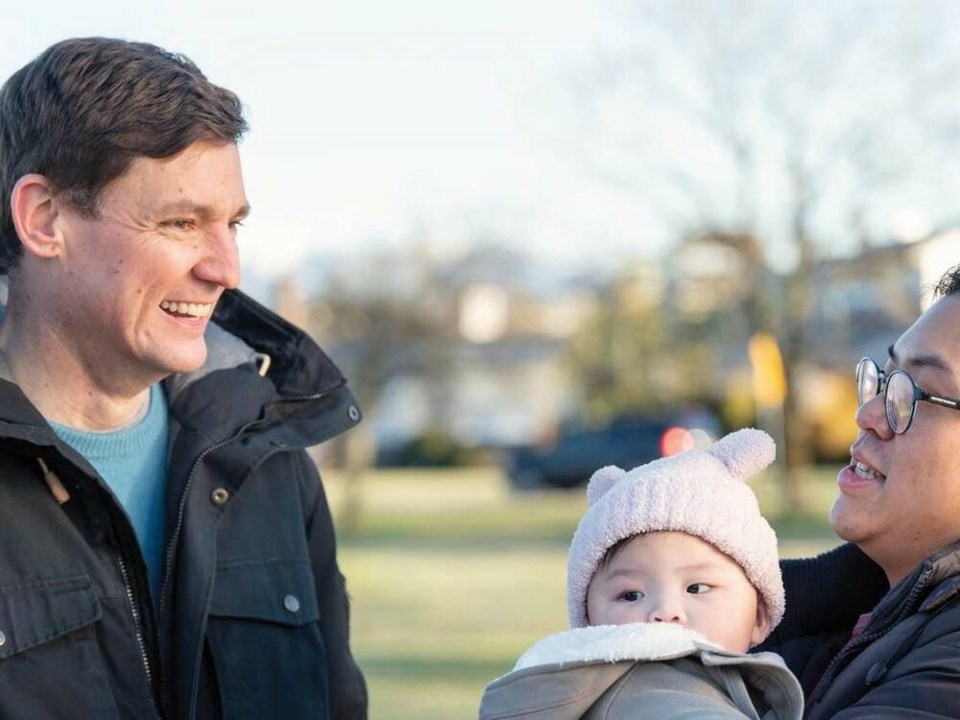David Eby has spent his first four months as premier announcing billions of dollars in spending thanks to an unprecedented economic windfall. With a financial outlook expected to worsen in the next year and an opposition party in the middle of rebranding, pundits say the conditions are perfect for a snap election.
While Eby has repeatedly said he’s wedded to the fixed election date, that hasn’t stopped opposition parties from girding for one to avoid being caught off guard.
“I think the [political] winds say call a snap election. I don’t think David Eby will,” said Michael Gardiner, a B.C. NDP political strategist who worked on the party’s successful 2017 campaign.
Gardiner, president of Strategies 360 Canada, said the factors behind early-election speculation include a strong economy and Eby’s strong showing in opinion polls despite being a relatively new leader.
There’s also the fact that the B.C. Liberals are in the middle of a rebranding exercise as the party prepares to change its name to B.C. United under the helm of Leader Kevin Falcon.
“All of those things point to an election being an opportunity,” said Gardiner, who has not been involved in any of Eby’s campaigns. “But even in that context, I believe David Eby will see his way through the term because he believes in that.”
During a press conference to announce a $479-million bailout for TransLink Wednesday, Eby was asked again if he plans on capitalizing on his spending spree by calling an election before the fixed date of Oct. 19, 2024.
“I’m committed to the fixed election date,” he said. “I hope when British Columbians ultimately go to the polls that they see results and that they vote accordingly for the government that’s supporting them and acting on their priorities.”
Eby has defended the use of taxpayer dollars to fund a radio ad that praises him for “taking real action” to address issues facing British Columbians. Eby said the public deserves to know about what the government is doing about key issues like affordability.
The NDP caucus spokesperson, Matt Hannah, said the radio ad “is not paid for with government funds, but from the fixed caucus budget that is allocated for the work of B.C. NDP MLAs.”
Separate campaign-style videos on social media and paid for by the party show Eby, dressed in casual clothes rather than a suit and tie, talking to British Columbians at a playground and at a hockey rink, and attacking the B.C. Liberals for making life better for those at the top.
Hamish Telford, a political scientist with the University of the Fraser Valley, said the ads aren’t a smoking gun that an election is imminent. It’s normal for a party to be promoting its new leader and for the leader to be as visible as possible during spending announcements, he said.
“A new premier who’s not really well known outside of political circles would want to establish himself as the new boss in town,” Telford said. “He would want to get out there and meet people and make these announcements.”
An Angus Reid poll released last week shows Eby’s popularity in the middle of the pack among 91Ô´´ premiers with a 48 per cent approval rating.
The number people polled who had no opinion on Eby dropped by 10 percentage points in the latest poll, but the majority of those voters ended up saying they disapprove of the new premier.
“If you’re a premier with approval at or above 40 per cent, that’s bankable. You can you can take that to the bank for a line of political credit,” said Shachi Kurl, president of the Angus Reid Institute.
Despite the relatively rosy polling picture, Kurl said Eby is clearly gauging the public temperature, which is more concerned with affordability, health care, public safety and the opioid crisis than the next election.
Caroline Elliott, vice-president of the B.C. Liberal party, said if Eby breaks his promise not to call a snap election, it would speak volumes about his character.
“It’s kind of an integrity issue. It’s a character issue,” she said.
Elliott acknowledged that former premier John Horgan was not punished by the electorate when he decided to call a snap election in 2020 — delivering the NDP their largest majority — but she’s not sure the public would be as forgiving of Eby.
Elliott said the party is ensuring its election readiness at the same time as it undergoes the name change process.
No date has been set for when the B.C. Liberals will become B.C. United and Falcon has said it will be timed to ensure the ruling New Democrats don’t take advantage of the relatively unknown party name.
The B.C. Greens have vowed not to not be caught off guard again, which is why it has opened up its nominations process and named a second deputy leader, Dr. Sanjiv Gandhi.
The New Democrats must also consider how the redrawing of the electoral map could help them in a future election.
B.C.’s Electoral Boundaries Commission will deliver its final report on April 3 with recommendations on new electoral districts in areas of rapid population growth.
A preliminary report released in October recommended the creation of six new electoral districts, in 91Ô´´, Burnaby, Langley, Surrey, Kelowna and Langford on 91Ô´´ Island. The new ridings could benefit the NDP since several of them are in New Democrat strongholds.
If the legislature approves the new ridings, it would bring the total number of seats in the legislature to 93.


